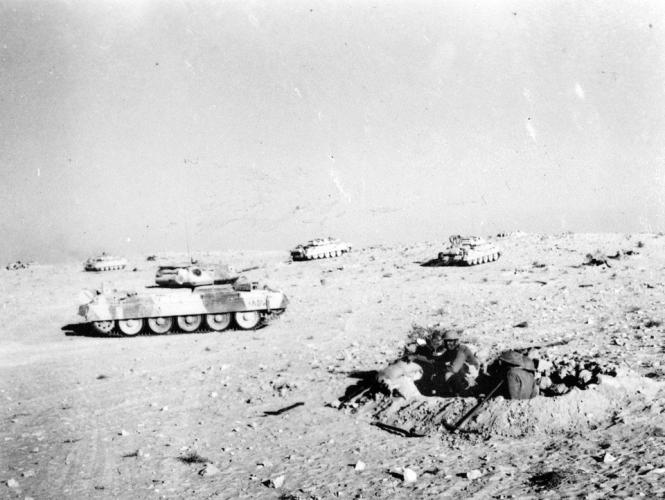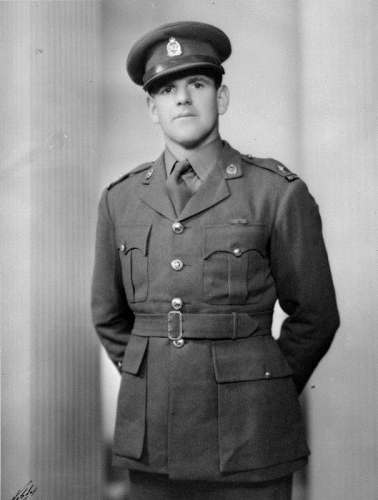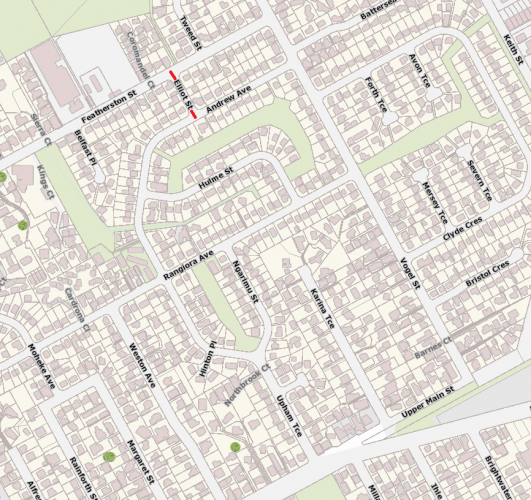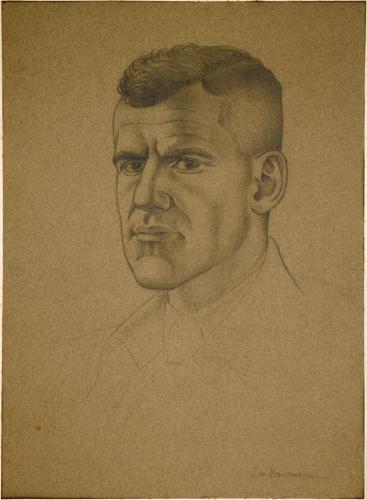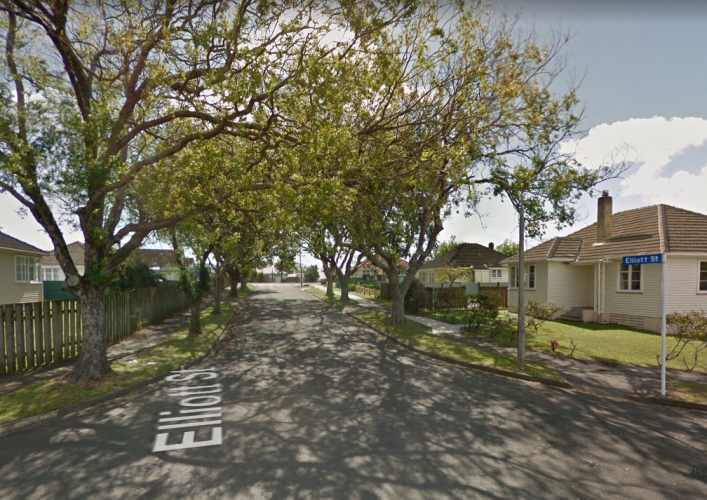114 Elliott St Palmerston North, street scene 2017
Reason for the name
This street was named in honour of 2nd Lieutenant Keith Elliott VC
The suburb now known as Roslyn was originally part of the suburb of Terrace End. One of the early residents of Terrace End was Mr Charles Ross, a draper, who built a large house in the area. After his death in 1924, his widow sold 20 acres of land to the Government, who promptly named the area Roslyn in honour of him. Following the initial state house development of Rangiora Avenue on this land, further sections to the east of the area were sought for redevelopment. This included sections 173 to 179, owned by J D Buchanan, another prominent Palmerston North local, and this land was purchased by the Department of Housing in November 1944.
Author: Evan Greensides, Heritage Assistant for Palmerston North City Libraries & Community Services.
About 2nd Lieutenant Keith Elliott
Keith Elliott was born on 25 April 1916 in Apiti, north-east of Feilding, and was the eighth of nine children to Thomas Elliott and Ethel Knyvett. After living on multiple farms in the Manawatu region, the Elliott family moved to Feilding where Keith attended Feilding Agricultural College. Following the completion of his studies in 1932 he commenced farm work, eventually becoming the manager of a 96-acre family farm at Marima, near Pahiatua, in 1935.
Keith was working on the family farm near Feilding in September 1939, when his father rushed through the paddocks, waving his arms, yelling that Britain had declared war on Germany. His memoirs state his immediate response was:
I must go. That was the only thought in my mind. Out of the simplicity of those three words was to arise something that was to completely change the course of my life… No time was to be lost.
After basic training he was given the rank of private in No. 11 Platoon, B Company, 22nd Infantry Battalion and embarked for Europe on 1 May 1940 with the 2nd Echelon, New Zealand Expeditionary Force aboard the Empress of Britain. Upon his arrival in Great Britain Keith was promoted to lance corporal and spent a relatively uneventful rest of the year across numerous camps. On 5 March 1941 he entered Egypt and embarked with Lustre Force later that month for service in Greece.
Arriving on Crete on Elliott’s birthday, 25 April, the 22nd Battalion was tasked with defending the strategically important Maleme airfield. While he was wounded in action during the first German parachute assaults, Keith remained with his unit throughout the action and safely withdrew from defensive positions with the rest of his men. Arriving safely back in Egypt in June after the evacuation of Crete, Keith was promoted to Corporal, followed by further promotions to Lance Sergeant and Sergeant in September and October respectively.
Keith took part in Operation CRUSADER and joined the platoon tasked with defending 5 Brigade Headquarters at the Sidi Azeie airfield. It was here that the unit was overrun by Rommel’s Afrika Corps, with Keith being taken prisoner on 27 November. Held at Bardia for two months on a near starvation diet in overcrowded prison pens, Keith lost half his body weight and succinctly described the ordeal as, “moments of misery, hours of heartache, days of depression”. On 2 January 1942 he was released when South African soldiers captured the prison camp as allied forces advanced towards Tobruk. While resting in Syria after his return to 2nd New Zealand Division he contracted malaria and spent weeks in the New Zealand General Hospital in Nazareth.
Missing the division’s hasty return to Egypt in June to blunt Rommel’s latest offensive due to his illness, Keith rejoined his platoon on 13 July. Due to sickness and a shortage of officers he found himself in command of the platoon for the forthcoming assault on Ruweisat Ridge with 22nd Battalion leading. Taking the ridge after encountering fierce resistance from the German and Italian troops defending it, the 22nd Battalion dug in for the night. Unbeknownst to them, their attack had placed them in the middle of 10 tanks part of 15 Panzer Division. At first light the panzers unleashed a counterattack which captured all of 22nd Battalion, with the exception of Elliott’s platoon.
Disobeying direct orders to defend the area and down to just 19 men, Elliott led his platoon to the cover of a ridge where it re-formed. Receiving a chest wound from a tank’s machine gun, the platoon continued on to another ridge where they linked up with two platoons of 21st Battalion, just in time to see the rest of his battalion being led to captivity. Hearing a report of a wounded New Zealand officer lying to the north, Keith volunteered to search for the man, taking a group of 8 others with him. Soon after heading out the group came under heavy fire from an Italian machine-gun crew. Leading 3 men in a direct bayonet charge across open ground, the crew soon surrendered four machine-guns and an anti-tank gun. Coming under fire from 2 more machine-gun posts and leaving his men behind to sort the new POWs, Keith charged and captured both on his own. A final, fourth machine gun was captured after Keith was wounded and had charged the position across 200 meters of open ground with bayonet and grenade. Although badly wounded through his actions on 15 July, he led his men to friendly lines and handed over 142 prisoners. The wounded officer whose injuries had initiated the action was rescued by another unit and survived the war.
After linkingup with an Indian unit, Keith was evacuated to the New Zealand General Hospital where he spent the next three months recuperating from his numerous wounds. While in hospital the 22nd Battalion’s commanding officer, Lieutenant Colonel T C Campbell, initiated a Victoria Cross recommendation. Keith was only told of the award of the Commonwealths highest bravery medal a day before it appeared in the London Gazette on 24 September 1942 while at lunch in the sergeant’s mess at Maadi Camp. His overwhelming feeling after hearing the news was that he “felt an urgent need to go to the toilet”. The citation for his Victoria Cross sums up his actions neatly:
Owing to Sergeant Elliott's quick grasp of the situation, great personal courage and leadership, nineteen men, who were the only survivors of B Company of his battalion, captured and destroyed five machine-guns, one anti-tank gun, killed a great number of the enemy and captured one hundred and thirty prisoners. Sergeant Elliott sustained only one casualty amongst his men, and brought him back to the nearest advanced dressing station.
Following the news General Freyberg gave Keith Elliott a commission, while Lieutenant-General Montgomery presented his Victoria Cross ribbon; the presentation of the full Victoria Cross had to wait for another two years.
It was decided in May 1943 that Keith would sent back to New Zealand, a decision which may have been precipitated by the capture of Charles Upham, another Victoria Cross recipient, earlier that year. Arriving home on 12 July he experienced discomfort around his new found fame, writing “It was an ordeal for which I was unprepared and I was thankful when I could escape from time to time to replenish my resources by working around the farm.” Having returned to farming around the Pahiatua region, Keith ceased service with 2NZEF in December 1943. He finally received his Victoria Cross medal proper in Wellington on 2 August 1944, presented by Governor-General and Marshal of the Royal Air Force, Sir Cyril Newall. In recognition of the importance the school had played in his life, Keith would later donate his Victoria Cross to Feilding High School.
After moving to Hastings in early February 1944, Keith married Margaret Rachel Markham, whom he had met before the war. The couple began married life on a rehabilitation farm and would go on to have five children – three sons and two daughters. However, Keith’s career was to change markedly when he began studying for the priesthood in February 1946, being ordained as a minister in the Anglican Church a year and a half later. Having travelled a number of paths and experiences after being awarded the Victoria Cross, Keith commented:
It opens all sorts of door. Good doors as well as bad doors. It depends on which one you want to go through. I happened to go through the right one.
Keith served as a curate in Palmerston North before taking up the position of first padre appointed to Linton Military Camp, primarily for the initial intake under the new Compulsory Military Training Scheme. Afterwards, he worked for many years in the Maori Mission before moving to Wellington as the Assistant City Missioner, and later as Welfare Officer for the Fire Service.
After being posted to the Retired List for Officers in 1962, Keith collaborated with Rona Adshead on his autobiography, From Cowshed to Dogcollar. At the age of 61 Keith undertook the 3400 kilometre journey from Cape Reinga to Bluff in order to raise money for a new church and community hall. He retired as the vicar of Makara-Karori West parish, becoming a keen bowler and prominent member of the Raumati South Bowling Club. Reverend Keith Elliott passed away on 7 October 1989 at Te Omanga Hospice in Lower Hutt. His medals are held by the National Army Museum, Waiouru, New Zealand.
Honours and Awards
- Victoria Cross
- 1939-1945 Star
- Africa Star
- Defence Medal
- War Medal, 1939-1945
- New Zealand War Service Medal
- Coronation Medal, 1953
- Silver Jubilee Medal, 1977
Citation for the Victoria Cross:
On 15 July 1942 at El Ruweisat Ridge, Western Desert, Sergeant Elliott was wounded in the chest while leading his platoon in an attack under heavy machine gun and mortar fire. Nevertheless, he carried on and led his men in a bayonet charge which resulted in the capture of four enemy machine-gun posts and an anti-tank gun. Seven of the enemy were killed and 50 taken prisoner. In spite of his (four) wounds Sergeant Elliott refused to leave his platoon until he had reformed them and handed over the prisoners, the number of which had by then increased to 130.


